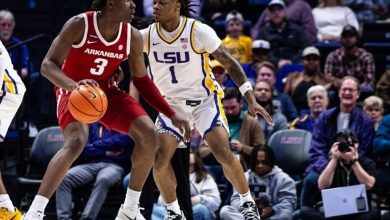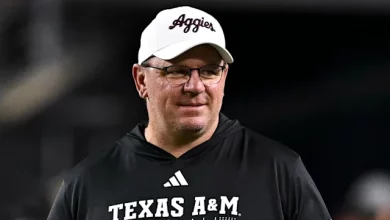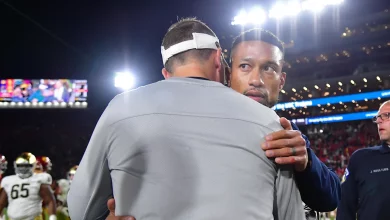Greg Brooks Jr., a former football player for LSU, makes a public statement in a television appearance following his lawsuit.

In a world where athletes are often seen as invincible figures on and off the field, Greg Brooks Jr. is breaking that mold, revealing a side of sports that many fans rarely witness. Known for his time as a defensive back with the LSU Tigers, Brooks is now taking a bold step by making a public statement following a lawsuit against LSU, related to his treatment and experiences within the program. Brooks’ appearance on national television to discuss the lawsuit and his perspective is not only a significant moment in his career but also highlights deeper issues concerning player well-being, medical care, and the responsibilities of university athletic programs.
This article delves into Greg Brooks Jr.’s television appearance, the details surrounding his lawsuit, and the broader implications for college athletics, focusing on the intersection of player health, institutional responsibility, and the role of media in shining a light on these often-overlooked issues.
Background: Who Is Greg Brooks Jr.?
Before examining the significance of Brooks’ public statement, it’s crucial to understand who Greg Brooks Jr. is and what led him to be in the spotlight for reasons beyond his athleticism.
Greg Brooks Jr. is a Louisiana native and a highly recruited football player who played for the LSU Tigers as a defensive back. His time at LSU was marked by his dynamic ability on the field, contributing to the team’s success and making him a standout player in the secondary. Brooks’ athletic prowess made him a fan favorite and a valuable asset to LSU’s defense.
However, despite the success on the field, it was his experiences off the field that would soon bring him into the public eye for reasons unrelated to football. It was these experiences that led to his decision to file a lawsuit against LSU, alleging medical negligence and a lack of support from his coaches and the athletic program. In a time when player well-being is becoming an increasingly hot-button issue in college athletics, Greg Brooks Jr.’s case has become one of the more prominent examples of the struggle many players face.
The Lawsuit: Allegations of Medical Negligence and Neglect
The lawsuit filed by Greg Brooks Jr. centers on allegations of medical negligence during his time at LSU. According to Brooks, he sustained injuries during the course of his football career that were not properly addressed by the LSU medical staff, nor was he given the adequate medical attention needed for recovery. The case sheds light on the behind-the-scenes challenges that many student-athletes face—particularly when it comes to the physical toll that football takes on their bodies.
The Specifics of the Allegations
Brooks alleges that despite suffering from significant injuries, particularly related to his head and neck, LSU’s medical staff and coaching staff failed to follow appropriate procedures and provide adequate care. In the lawsuit, Brooks claims that:
- Neglect of Injuries: The treatment he received for injuries, including concussions and neck issues, was insufficient. He contends that proper medical protocols were not followed, which led to exacerbated pain and long-term health concerns. In some instances, Brooks believes he was pushed to return to play before he was fully healed.
- Failure to Communicate: One of the most glaring allegations in Brooks’ lawsuit is the claim that the LSU coaching staff and medical personnel failed to adequately communicate with him regarding the seriousness of his injuries. There was reportedly a lack of transparency regarding the potential risks of continuing to play with these injuries, which left him vulnerable and without the proper knowledge to make informed decisions about his health.
- Emotional and Mental Health Concerns: The physical toll on Brooks’ body was compounded by the emotional and psychological burden he faced, something that is often overlooked in the conversation about student-athletes. The pressure to perform, combined with the inadequate medical support, contributed to a sense of isolation and stress that significantly impacted his well-being.
Brooks’ Public Statement: The Television Appearance
Following the filing of the lawsuit, Greg Brooks Jr. made a television appearance where he discussed his experiences in detail. The interview was not just about recounting the specifics of his case; it also served as an opportunity for Brooks to express his frustrations with the system and the culture of college football, particularly in terms of player care.
Courage to Speak Out
For many athletes, speaking out about mistreatment, especially against a powerhouse program like LSU, can be a daunting decision. The university and athletic programs often carry immense influence, and athletes may fear retaliation or damage to their careers. Yet, Greg Brooks chose to speak publicly about his lawsuit, using his platform to advocate for player rights and athlete welfare.
In his interview, Brooks expressed a deep sense of frustration not only with the medical neglect he felt but also with the culture surrounding college football. He stressed that while coaches and medical staff focus on winning, they often neglect the well-being of the players who are putting their bodies on the line. His decision to speak out, despite potential repercussions, underscores the broader issue of how college athletes are treated—especially after their playing days are over.
The Emotional Toll
Brooks became visibly emotional during the interview, reflecting on the struggles he faced in dealing with his injuries and the lack of support he felt from the program. He discussed the mental anguish he experienced as he tried to manage both the physical pain of his injuries and the emotional toll of feeling unheard. He also mentioned how this experience has shaped his perspective on life after football, stating that he is now more focused on advocating for changes in the way that college athletes are treated.
Legal Implications and What’s at Stake
The legal ramifications of Brooks’ case go beyond his own personal experiences. His lawsuit, if successful, could have broader implications for college athletics. It could force universities and athletic programs to reassess their approach to player care and safety, especially when it comes to long-term health outcomes.
Brooks’ public statement not only shed light on his own journey but also brought attention to the larger systemic issues in college football that often go unaddressed. Players frequently deal with significant health concerns but may not receive the proper medical care or the support they need, especially after they’ve left the playing field. The NCAA and college football programs have been criticized for not providing enough safeguards for players’ mental and physical well-being, and Brooks’ case is a clear example of why these issues need to be tackled head-on.
The Broader Context: Player Welfare in College Football
The issue of player welfare is an ongoing conversation in the world of college football. Stories like Brooks’ are unfortunately not isolated. College football players are often expected to sacrifice their bodies for the sake of their teams, with little regard for the long-term consequences. Injuries that are commonplace in football, particularly concussions and neck injuries, have been shown to have lasting effects on players’ health long after their careers end. This includes an increased risk of chronic traumatic encephalopathy (CTE), as well as other physical and mental health challenges.
In recent years, there have been efforts by the NCAA, as well as individual schools, to implement better concussion protocols and provide more resources for mental health. However, as Greg Brooks Jr.’s case demonstrates, these efforts may still fall short in some areas. The importance of creating a more athlete-centered approach to player health and well-being cannot be overstated.
The Role of the NCAA and University Athletic Programs
The NCAA and college athletic departments must be held accountable for the health and safety of student-athletes. Coaches, medical staff, and administrators need to prioritize the welfare of players, especially when they are suffering from serious injuries. Players often feel pressured to push through injuries in order to contribute to the team’s success, but this can lead to long-term consequences.
Universities must implement stronger safeguards for injured players and establish clearer protocols to ensure that players receive proper medical attention and follow-up care. Moreover, mental health services must be an integral part of every program, as the pressure to succeed can take a heavy toll on players’ emotional and psychological well-being.
Greg Brooks Jr. and the Future of College Athlete Welfare
Greg Brooks Jr.’s decision to file a lawsuit against LSU and to speak out publicly on national television has ignited an important conversation about the treatment of student-athletes in college football. His case underscores the need for greater accountability and reform within college athletic programs, particularly in the areas of medical care and mental health.
As Brooks continues to pursue justice for the injuries he sustained, his courage in speaking out could set a powerful precedent for other athletes who feel voiceless in the face of institutional power. While his lawsuit is still ongoing, it’s clear that his story has already had a significant impact on the conversation about how college football programs treat their players.
Brooks’ message is a reminder that college football is about more than just wins and losses—it’s about the well-being of the athletes who make the game possible. As the conversation around player welfare continues, it is hoped that stories like Greg Brooks Jr.’s will lead to meaningful changes in the system, ensuring that no player is left behind in the pursuit of success.









